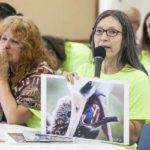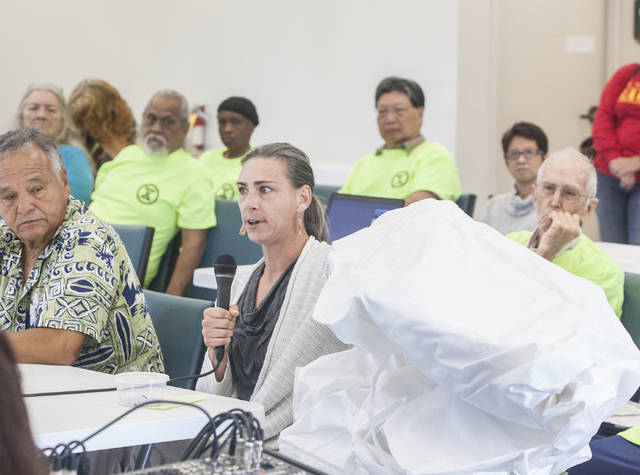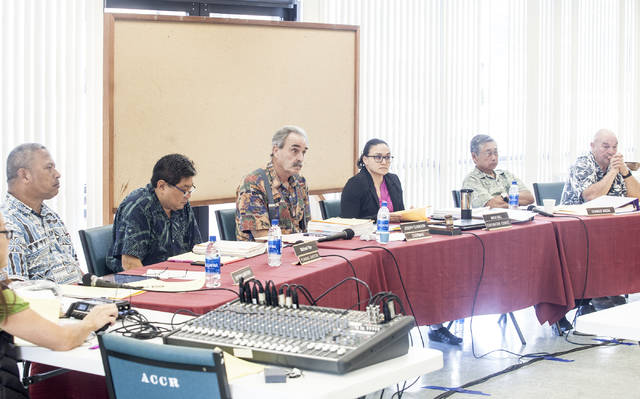The Windward Planning Commission postponed action on a proposed bottling plant near Wailoa River State Recreation Area to a future meeting, but that didn’t stop dozens of Big Island residents from testifying against it during the panel’s Thursday meeting.
In 2018, Piilani Partners, a company intending to open a bottling plant at the intersection of Piilani and Mililani streets in Hilo, applied for a Special Management Area use permit to allow the company to drill an approximately 1,000-foot well at the site and tap into the Maunakea aquifer.
That application was deferred in December to be decided on during Thursday’s meeting. However, at the outset of the meeting, commission chairman Joseph Clarkson announced the issue would be deferred again to a later date.
Although no action was taken, and despite Clarkson assuring citizens they could testify during a later meeting with representatives of the Piilani Partners present, dozens of citizens in attendance lined up to submit their testimony regarding the issue.
Testimony was universally negative. Permitting a bottling plant to open on the Big Island, at a time of raised social awareness of the impact of plastic pollution on the ecosystem, appeared to be a deeply and fundamentally unpopular proposal, with residents expressing concerns about the health of the world’s oceanic ecosystems.
“All I can say is it’s asinine,” said testifier Mattie Larson, who owns Upcycle Hawaii, a business that recycles ocean-borne waste into products.
Larson said she was “flabbergasted” that Hawaii County is considering permitting a facility that will generate a particularly pernicious form of plastic waste, especially after Maui County successfully passed legislation to ban the use of styrofoam food containers last year.
The bottling process, Larson said, will involve shipping minuscule plastic pellets to the island, which will be molded into bottles and shipped away to markets. The completed bottles and the pellets themselves are harmful to sea life, should they enter the ocean, which millions of tons of plastic do every year.
Nelson Ho, member of the environmental nonprofit Sierra Club, said he has participated in beach cleanups and been disheartened by finding degraded plastic particles inextricably scattered among the beach sand, while fellow testifier Shirley Hargrove pointed out that plastic waste discarded today likely will outlive all of us.
“All the bottles will bring is continued waste and pollution,” Hargrove said. “Waste that’s indestructible; it won’t biodegrade.”
According to the application, the bottling plant would limit its water extraction to 200,000 gallons per day, or more than 1.2 million 20-oz. bottles per day.
Other testifiers raised concerns about whether the Maunakea aquifer could be contaminated or otherwise harmed by the bottling operation. Joseph Camara said the aquifer — currently a “closed, pristine water body” — could be contaminated, and even if it is not, permitting companies to drill with impunity only increases the risk to the aquifer in the future.
Moreover, Camara objected to taking public trust water to be commodified and sold off the island, which was echoed by several other testifiers.
Several of the testifiers wore shirts bearing the logo of Extinction Rebellion, an international social movement founded last year dedicated to fostering radical change to mitigate or avert climate catastrophe.
One of the members of Extinction Rebellion, Koohan Paik-Mander, cited last year’s report from the United Nations Intergovernment Panel on Climate Change, which estimated humanity has approximately 12 years to mitigate the worst impacts of climate change or else trigger a mass extinction event. Paik-Mander said the conclusions of the report should make the commission’s decision a “no-brainer.”
The Rev. M. Kalani Souza warned that Hawaii is in a position of leadership regarding environmental sustainability and that the state’s leaders should not compromise that trust with the hypocrisy of generating still more plastic waste.
Without representatives of Piilani Partners present, no counterarguments to the testimony were possible.
Continued testimony will be possible when the issue resurfaces at a future Windward Planning Commission meeting, although a date for that meeting has not yet been announced.
Email Michael Brestovansky at mbrestovansky@hawaiitribune-herald.com.











